You can refine the search results by filtering the items in search results and review sets based on the metadata of the items. Filtering is useful when you need to narrow your focus in a large list of items.
Filters are grouped together by metadata fields such as file type, from, modified date. Filters are usually displayed with the number of results that can be found in each group for a particular set of items.
The following table lists the filters in Compliance Search. A filter appears when it is valid for the set of items in your search results or review set.
|
Option |
Description |
|---|---|
|
Review Tag |
View items that have been given a tag by a Compliance Search user. |
|
File Type |
View the search results of a specific file type like outlook archive, binary, excel, word document etc. |
|
From |
View the emails from a specific sender. |
|
Client |
View the data from a specific client computer. |
|
Attachment |
View the emails depending whether they contain an attachment or not. |
|
Data Type |
View the email or file type data or both. |
|
Custodian |
View the emails from a specific owner |
|
Email Folder |
View the emails in a specific folder. |
|
Modified Date |
View the search results that were modified within the specified range. |
|
Size |
View the data with size within the specified range. |
|
Keywords |
Filter the search results based on individual keywords in a multi-keyword search query. Note This filter is only supported for data that was content indexed using the Search Engine. |
The options in the refinements pane vary according to the search result. For example, if you are searching in Files/Emails display view, and there are no emails in the search result, then the From and Email Folder options are not visible. Also, the number of search results in the refinements pane vary according to a selected parameter.
-
Review Tag: You can filter the items in a review set based on the tag or tags that you have applied. The number in parentheses after each tag shows the number of items with that tag.
-
File Type: You can filter your search results based on the type of file, for example, PDF, Excel, Word Document, and so on.
You can either type in the box or select from the suggested list. The number in parentheses after each file type shows the number of that file type in the search result. If there are no files of a type in the search result, then 0 is displayed.

-
From: If the search results contain emails, you can filter your search by the name or the email address of the sender.
You can either type the name or email address of the sender in the box or select the sender from the auto-suggested list. The suggested list contains the top four names. The number in parentheses after each name shows the number of emails from that sender. If a sender does not have an email in the search result, then 0 is displayed.
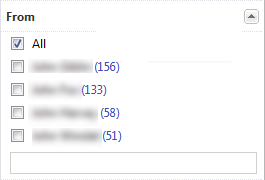
-
Client: You can search for the documents on a specific client computer. You can either select the client_name check box or select the client from the list. The number in parentheses after each client shows the number of documents in that client. If a client does not have a document in the search result, then 0 is displayed.
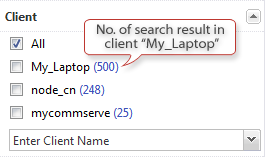
-
Attachment: You can search for emails that have an attachment or that do not have an attachment.

-
Data Type: You can filter the search results based on the type of data: files or emails. The number in parentheses after each data type shows the number of corresponding data types in the search result. If the search results contains one type of data, for example, either emails or files, then the Data Type facet is not shown.
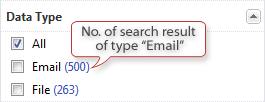
-
Custodian: You can search for emails by owner. You can either type the name or email address of the owner in the box or select it from the auto-suggested list. The suggested list contains the top four names. The number in parentheses after each name shows the number of emails from that owner. If an owner does not have an email in the search result, then 0 is displayed.
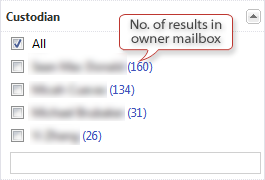
-
Email Folder: You can search for emails by their location i.e. whether the email is present in the Inbox or if the email is present in any other folder.
You can either select the check box from the default list or you can type the folder in the box. The number in parentheses after each folder shows the number of emails in the search result that are in that folder. If a folder does not have any email from the search result, then 0 is displayed.
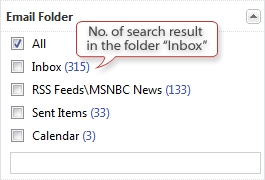
-
Modified Date: You can narrow down your search based on the modified date. You can either select the modified date check box from the default list or select the date from the calendar.
The search result will contain all the items in the modified date range (the dates are inclusive).
-
If you select Past Week check box, then the search result will contain items modified between the current date and 7 days before the current date.
-
If you select Past Month check box, then the search result will contain items modified between the current date and 30 days before the current date.
-
If you select Past Year check box, then the search result will contain items modified between the current date and 365 days before the current date.
-
If you select Beyond 1 Year check box, then the search result will contain items modified beyond 365 days (1 year) from the current date.

-
-
Size: You can filter your search results on the basis of size of a document. You can either select the size range check box or type the range in the box. The range is inclusive. The number in parentheses after each size range shows the number of documents in the search result that are in that size range. If a folder does not have any document from the search result matching the size range, then 0 is displayed.

-
Keywords: You can filter your search based on individual keywords in a multi-keyword search query. Select one or more keywords to filter the search results based on those keywords. The number in parentheses next to the keyword represents the number of results for the keyword in the currently selected search engine. This filter is only supported for data that was content indexed using the Search Engine and not the Index Server.
